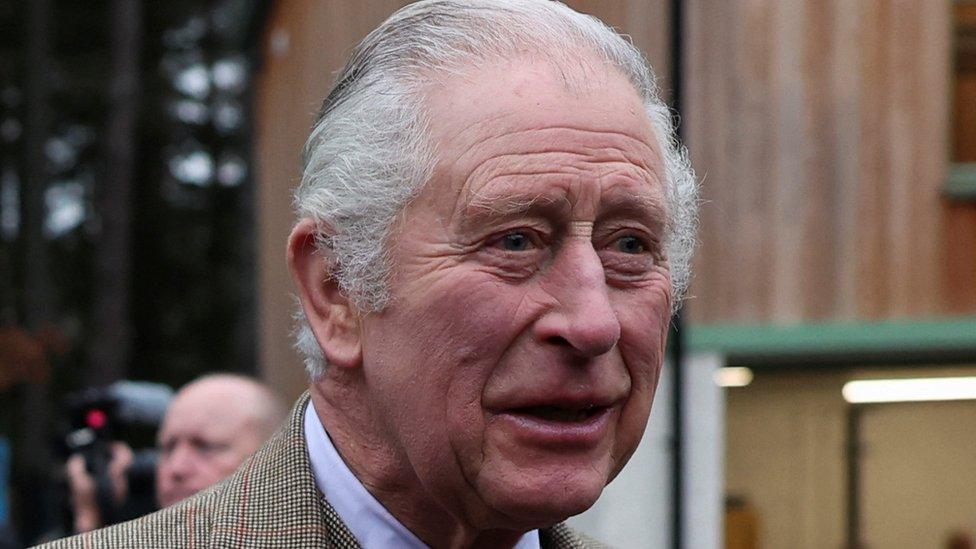King Charles to divert Crown Estate windfall to 'public good'
- Published

King Charles on a visit last week to a community project in Aboyne, Scotland
King Charles has asked for a surge in profits from six new offshore wind farms on the Crown Estate, worth 拢1bn, to be used for the "wider public good", rather than the Royal Family.
The Royal Household's public funding is based on 25% of Crown Estate profits.
But King Charles wants to reduce this percentage so that more is kept by the Treasury to be used for public spending.
The King spoke of the pressures of the cost-of-living in his Christmas speech.
In his Christmas message, King Charles highlighted the pressures of the cost-of-living crisis - and he seems to be taking action to avoid what could have been an awkward surge in income for the royals.
The Crown Estate is an independently-run, commercial business, whose profits go to the Treasury - but those profits are used as the benchmark for the level of public funding for the Royal Family, known as the Sovereign Grant, which last year was worth 拢86.3m.
These profits are now expected to be significantly boosted by deals to develop six new offshore wind farms, collectively worth 拢1bn per year for at least three years in fees from firms buying the rights to build wind farms on Crown Estate offshore sites.
This would have produced a very significant increase in the amount going into the Sovereign Grant, which could have proved embarrassing against a backdrop of financial pressures on the public.
Buckingham Palace says in light of the "offshore energy windfall", the King wants to reduce the slice of profits used to calculate the grant.
At present, the Sovereign Grant is based on 25% of Crown Estate profits - a temporary increase on the usual 15% - with the extra funding used for repairs and renovations for Buckingham Palace.
The grant is used for paying for the costs of working royals, such as travel for official engagements, and for the upkeep of royal palaces.
A review of this percentage of Crown Estate profits going into royal funding is currently under way with the Treasury, with a decision expected in the next few months.
Sir Michael Stevens, the Keeper of the Privy Purse, has written to the prime minister and chancellor to propose an "appropriate reduction".
But anti-monarchy campaigners, Republic, have rejected the move as "cynical PR to pre-empt a government decision to reduce the percentage".
The group's chief executive Graham Smith said the King's statement "reflected an arrangement he had no power to change".
Three of the new offshore wind farm locations are off the North Wales, Cumbria and Lancashire coast, and three are in the North Sea off the Yorkshire and Lincolnshire coast. Once developed, the ambition is for them to generate enough electricity for seven million homes.
This will add to the existing 36 operational offshore wind farms on Crown Estate sites off the coasts of England, Wales and Northern Ireland.
Dan Labbad, chief executive of the Crown Estate, hailed the benefits of this "next generation of projects".
"They demonstrate the far-reaching value that our world-class offshore wind sector can deliver for the nation - home-grown energy for all, jobs and investment for communities, revenue for the taxpayer, clean energy for the benefit of the environment, and a considerate, sustainable approach which respects our rich biodiversity," he said.